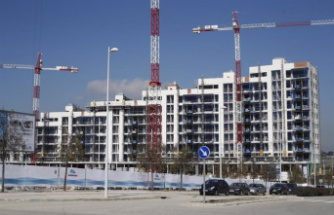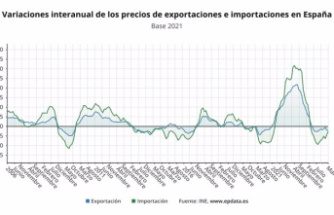The reduction in personal income tax for income of less than 60,000 euros and the increase in deductions approved today will have retroactive effect to January of this year
VALENCIA, 24 Oct. (EUROPA PRESS) -
The Valencian Government will raise the Personal Income Tax to the highest brackets, as well as the Wealth Tax for fortunes of more than 1.3 million euros, and will create a new rate of 11% in the Property Transfer Tax for property purchases of more than one million euros. These changes will apply from 2023, but will not take effect until the 2024 tax returns.
This has been agreed today by the Governing Council of the Generalitat, although its approval has been postponed until Monday and will be effective in the 2024 income statement, that is, after the regional elections in May and the general elections at the end of year.
This has been explained by the Vice President of the Valencian Government, Aitana Mas, and the Minister of the Treasury, Arcadi Spain, who have today presented the tax reform approved by the Governing Council of the Generalitat, which also includes a package of tax reductions for income tax average and low and an increase in deductions.
The agreed tax increases have been pending approval before next Monday and will affect the personal income tax rate for 2023, as well as the modifications to the Wealth Tax, which will be included in the budget and which will be what citizens will pay in the income statement they make in 2024.
On this second part of the agreement, the vice president explained that the minimums and deductions will be maintained and has indicated that a new personal income tax rate will be created so that "the highest brackets contribute more".
The highest sections of the asset value will also be increased by 0.25% for those who have wealth greater than 1.3 million euros, not counting the exempt minimum and the value of the habitual residence. With this proposal, they hope to raise 25 million euros.
Likewise, a new rate of 11% will be created in the Property Transfer Tax for purchases of real estate worth more than one million euros, with which they hope to collect 15 million.
Asked if the government that comes out of the next elections (scheduled for May 2023) could modify these measures, the vice president indicated that "in the same way that the 2022 reform has been approved retroactively, a new government could return to touch the one that is approved" on the income of 2023.
What the plenary session of the Consell of the Valencian Community has approved today has been the Law on Fiscal Measures, Administrative and Financial Management and Organization of the Generalitat, known as the 'accompanying law' of 2023, as well as the fiscal reform of 2022, which will mean a lower tax bill for 97% of Valencians. The proposals are specified in an increase in exempt minimums and more deductions.
The members of the Valencian Government have approved two separate texts: a draft law for the accompanying law and a decree law for the tax reduction, which will be noted in the next income statement, since it affects the year 2022 retroactively. The accompanying law includes the rates and taxes of 2023.
In this way, the measures that affect incomes of less than 60,000 euros will be effective from January 1, before the next regional elections, while the rest (including increases for higher incomes) would already be applied in 2024.
The 2022 tax reform will have retroactive effect on January 1, will reduce taxes for 1.3 million taxpayers with medium and low incomes and will report global savings of 149 million euros to families. Income of less than 30,000 euros takes most of the investment, with 101 million, and 962,000 taxpayers will have a zero quota.
A new rate for the regional section of personal income tax is included. There is a new section and the amounts of the liquidable base change. The rate applicable to the first tranche is lowered from 10% to 9% and the limit goes from 12,450 to 12,000. The second tranche rises from 17,500 to 22,000 euros and the applicable rate goes from 11% to 12%.
The third tranche reaches 32,000 euros (until now it reached 30,000) and the applicable rate will be 15%. The new section is created for the liquidable base of up to 42,000 euros, which will have a rate of 17.50, while that of up to 52,000 euros will have a rate of 20%. Until now, for a liquidable base of up to 50,000 euros, a rate of 18% was applied. The sections from 65,000 euros are not modified.
As for the minimum exempt from taxation, they all rise to the allowed 10%: the general rate goes from 5,550 euros to 6,105; the taxpayer older than 65 years will have from 6,700 to 7,370 and the older than 75 years goes from 6,950 to 7,645. The family minimum for descendants will go from 2,400 to 2,640 for the first child and from 4,000 to 4,400 for the third child. As for ascendants, for people over 65 years of age it goes from 1,150 to 1,265 and for people over 75, from 1,400 to 1,454.
From the Generalitat, they have given as an example that an income of 19,000 euros will save 97.95 euros; a taxpayer with an income of 48,000 euros will save 57 euros and someone who earns more than 65,000 will pay 0.1 euros more.
The minimum exempt from taxation will be increased to a maximum of 10% and the deductions of the Generalitat will be increased to the minimum income: "The amount and the income limit are raised," explained Spain. He has also highlighted the increase in Valencians who will have a zero quota, as these minimums increase.
The deductions also increase by 10%: the birth deduction, for example, goes from 270 to 300 euros, and the rent of the habitual residence increases its limit to 800 euros, from the current 700. The income limit to benefit from the deductions rises from 25,000 to 30,000 for the individual; and from 40,000 to 47,000 the set.
As for deductions for investments in renewable energy and self-consumption, the 40% is maintained, but the limit rises from 8,000 to 8,800 euros. For the indefinite hiring of domestic employees for the care of people, it has gone from 600 to 660 in the case of children under five years of age and from 1,000 to 1,100 for two minors or single-parent families.
Two new deductions are incorporated: 100 euros for the increase in mortgage interest, which will allow taxpayers to deduct 50% of the difference between interest paid in 2022 and that of the previous year with a limit of 100 euros. There will also be a deduction for women who are in fertility treatments not covered by public health.
The impact of the tax reform will only benefit incomes of less than 60,000 euros and will be neutral for those of more than 60,000. The average saving per taxpayer will be 111 euros.
Asked about the reduction in revenue that this tax reform will generate, Spain has indicated that by adding the two new deductions, it is expected that the Generalitat will stop entering some 180 million euros, although it has pointed out that this is an upward estimate.
Spain has remarked that the volume "is very small" since the Generalitat collected 4,400 million in 2020 with the regional section of personal income tax and 2,800 million in own taxes. For this reason, he has insisted that it is about using fiscal measures to "do social policy." "If we announced an aid plan of 200 million, we would also be asked where it is going to be cut," she pointed out.













